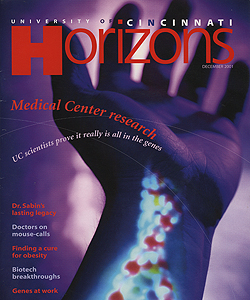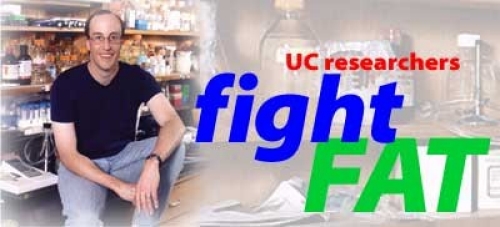by John Bach
Scientists at the University of Cincinnati are convinced the secret to obliterating obesity may have little to do with diet and exercise. In fact, they say, the ultimate panacea for fighting fat doesn’t lie within the body, but rather the brain.
To hunt down a remedy for significantly overweight people, professors Stephen Woods and Randy Seeley are working with UC's obesity project team to focus millions of dollars in private and public research funding on discovering how the brain controls how much we eat.
"We live in a society where the rates of obesity are climbing exponentially," says Seeley, associate professor of psychiatry. "It is a disease that has received woefully little attention from the medical community. People pay attention to weight a great deal, but for the wrong reasons. They want to look like Cindy Crawford. But the health impact of being overweight is unmistakable."
According to the American Obesity Association (AOA), more than half of Americans are overweight and more than one-third of all adults and one in five children are obese. That is more than 70 million obese people in this country alone.
Add those figures to these facts: People who are overweight increase their risk of dying from illness and disease by 60 percent, and those who make it to obese are at a 100 percent greater risk. The AOA blames obesity for at least 300,000 deaths in the U.S. each year.
"The deleterious effects of obesity on your health are enormous," Seeley says. "Most doctors know that. But how many times have you had a doctor discuss it with you? Almost never. Why? Because they don’t have a treatment."
Traditional advice from doctors is to eat less, eat better and get some exercise. Sensible guidance, but not a proven method for obese individuals to lose significant amounts of weight and keep it off. The same failure is true of weight-loss drugs, though Americans continue to spend billions of dollars on them every year.
Seeley says there are drugs on the market that act in your brain to regulate food intake, like sibutramine (the active ingredient in Meridia). Such drugs only have "modest effects."Furthermore, most of the herbal treatments, he says, don’t carry an FDA approval.
"Nobody has proven they work over the long haul," he explains. "All the FDA says is that people don't drop dead when they take it. There are lots of claims that things work. Everybody can lose weight for a couple of months. Why? Because you are watching what you are doing."
He maintains the placebo effect accounts for most dieters' successes. "You don’t have to give these people anything. If I tell you I’m going to weigh you every week for the next three months, most people will lose weight. You lose weight for three months, then you gain the weight back.
"Then slick marketers get to blame the person who gained it back and sell them something else. It is the best repeat customer base in the country -- a wonderful scam."
Scientists at UC aren't focusing on the next miracle drug. Instead, they are delving into why it is so hard to keep weight off. The obesity team's work stems from a discovery in 1994 that found, in short, fat cells produce a hormone called leptin and leptin levels indicate to your brain how much fat you have. When a significant amount of fat goes away, leptin levels fall, and the brain responds by slowing down your metabolism and telling you to eat.
Essentially, the UC team is working on ways to dupe the brain.
"The body has a system that was designed to keep you from starving to death," Seeley says. "It is essential. It is important. Trying to trick it is not easy.
"It was designed to get you out of the cave, to go face the saber-toothed tiger, to hunt and gather and get your food anyway. In an environment where there is a Seven-Eleven store or a UDF on every corner, it is pretty hard to fight that system."
But not impossible. Before coming to UC, Seeley was at the University of Washington, involved in groundbreaking research that discovered rats become obese when their receptors for the hormone leptin are chemically blocked. The research proved that obesity results when receptors in the central nervous system, called melanocortin-4, are turned off and can’t receive the chemical messages that signal the brain to stop eating.
Resulting studies suggest that a person may become obese because their body is resistant to the effects of leptin. Soon after publishing his work, Seeley received job offers from around the country.
Calculate your body mass index to see if you are fit, overweight or maybe even obese

 Past Issues
Past Issues